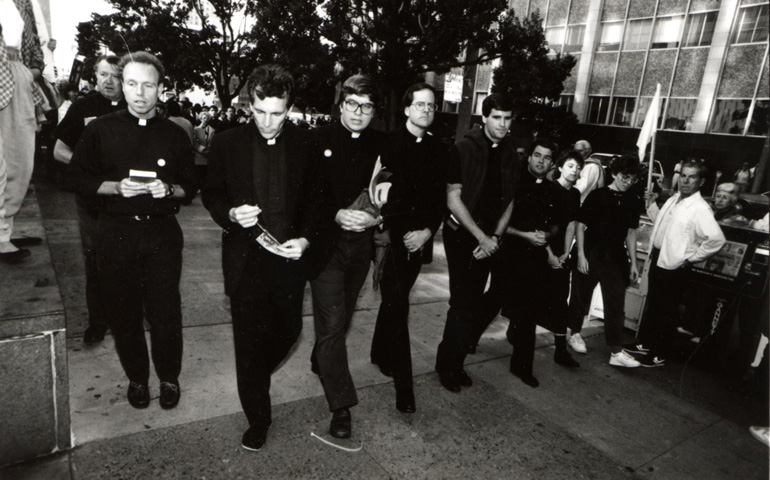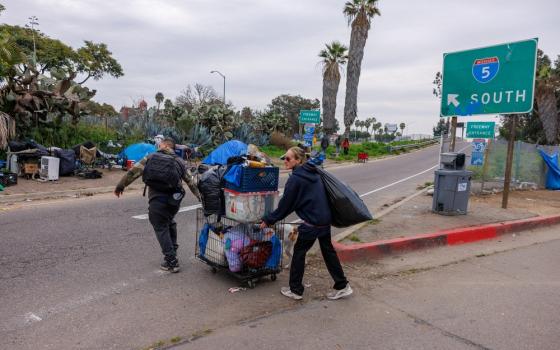
Jesuit priests march outside the Federal Building in San Francisco Nov. 20, 1989, to protest the killing of six Jesuit priests and two women four days earlier in El Salvador. More than 300 people joined the demonstration. (CNS/The Catholic Voice/Chris Duffey)
Sunday marks the 25th anniversary of the massacre at the University of Central America in San Salvador, El Salvador. On Nov. 16, 1989, a Salvadoran military squad entered the campus, where they shot and killed Jesuits Ignacio Ellacuría, Ignacio Martín Baró, Segundo Montes, Joaquín López y López, Amando López and Juan Ramón Moreno, as well as their housekeeper, Elba Ramos, and her daughter, Celina.
This is one of two articles that look back on the event and its ramifications. Read the first story.
The murder of the Jesuit priests at the University of Central America in San Salvador, El Salvador, on Nov. 16, 1989, galvanized the Jesuit community in the United States like nothing had ever galvanized it before. Six fellow members of the Society of Jesus had been roused from their beds in the middle of the night by a unit of the Salvadoran army, ordered to lie side by side on the grass, and shot one by one in the back of the head.
The assassinations were truly shocking, and no Jesuit anywhere in the world could be expected to react with anything other than outrage. But the murders at the university were especially challenging for the several thousand members of the Society of Jesus who also happened to be citizens of the United States of America. Jesuits in the U.S., like all Jesuits, had to absorb the fact that their brothers had been brutally executed. But Jesuits in the U.S. also had to face the additional fact that these executions had been carried out by a military force that enjoyed the full political and financial support of their own government.
This complex dynamic, involving multiple identities and cross-cutting loyalties, was at the heart of U.S. Jesuits' varied responses to the murder of their brothers in El Salvador. Jesuit spirituality emphasizes "discernment," a prayerful willingness to seek the will of God in all circumstances and to conform personal preferences to it. For Jesuits, however, discernment is never the end goal; action is. Jesuits, both individually and collectively, greatly prize action grounded in discernment. It is frankly difficult to imagine anything more likely to spur American Jesuits to action than the complicity of their own government in the violent death of their fellow Jesuits.
Members of the Society of Jesus, however, do not act in an institutional vacuum. Yes, U.S. Jesuits were united in a desire to do something, to turn spiritual discernment and communal solidarity into effective action. But the forms their actions took were almost exclusively defined by the "educational apostolate" with which Jesuits are so closely identified in the United States.
When the leadership of a Jesuit university was decimated in San Salvador that night, experienced (and physically courageous) Jesuit administrators and faculty members in the U.S. immediately volunteered to replace them. When the University of Central America was then faced with a potentially crippling debt repayment, experienced (and financially savvy) Jesuits in the U.S. arranged creative ways to restructure the debt without sacrificing the university's institutional autonomy.
And when Jesuits in the U.S. decided that pressure needed to be placed on the Salvadoran government to prosecute the "intellectual authors" of the crime, and on the U.S. government to cut off funds to a Salvadoran military that housed and protected those culprits, American Jesuits had the prominent platforms of well-respected universities from which to speak and act.
For example, Jesuit Fr. Leo O'Donovan, president of Georgetown University, was able to publish a scathing op-ed in The Washington Post the very morning after the murders. He cited the urgent need for an immediate cease-fire in the Salvadoran civil war, and he called on the government in San Salvador (and its patrons in Washington) to aggressively investigate a crime that even on that first day the Jesuits assumed had been ordered by the Salvadoran military's high command.
Jesuit Fr. Joseph O'Hare, president of Fordham University, delivered a sermon during a widely publicized Mass held in New York within a week of the murders, in which he asked the question that came to frame the entire debate over U.S. policy in El Salvador: "Can we hand weapons to butchers and remain unstained by the blood of their innocent victims?"
O'Hare was also a member of a five-man delegation, all presidents of Jesuit universities, who traveled immediately to El Salvador. Their aim was to demand, in person, that an aggressive investigation be launched into who had ordered the killings. But it was also, in a very practical sense, to provide support and protection to the remaining Salvadoran Jesuits who felt they might be in imminent mortal danger.
In the ensuing weeks and months, moreover, a very specific political dynamic repeated itself across the country. Presidents and faculty members at Jesuit universities made full use of their positions to draw the attention of the media to the atrocity at the University of Central America, and to pressure members of Congress to alter U.S. policy in El Salvador. It certainly didn't hurt that many of these politicians were members of what Rep. Nancy Pelosi (whose district included the Jesuits' University of San Francisco) called at the time "the Jesuit family" of people with personal, familial or community ties to educational institutions run by the Society of Jesus.
One Jesuit deeply involved in these activities used a Spanish term to define the way that U.S. Jesuits responded to the murders. They acted universidadamente, he said, in that they applied the considerable institutional resources at their disposal to advance a cause that was very close to their hearts.
This evocative Spanish term can be used in an even deeper sense in this context. The U.S. Jesuits were also motivated to action by their realization that the Jesuits in El Salvador had been murdered precisely because, as administrators and faculty at the University of Central America, they had also been acting universidadamente. They had been applying the considerable public resources of their own educational institution in an effort to fulfill the oft-expressed Jesuit commitments to the "service of faith and the promotion of justice."
These are challenging commitments for Jesuit universities in the U.S. to uphold and advance. It is one thing to serve faith and promote justice in an urban parish or in traditional social service contexts. But as the president of Georgetown University in Washington? Or Santa Clara University in Silicon Valley? These are leading universities with national reputations for academic inquiry, professional training and socioeconomic advancement. How "Jesuit" should these institutions be in terms of their missions, pedagogy and priorities? How should they serve faith and promote justice without sacrificing academic freedom and without alienating the largely middle-class professional populations that make up their student and alumni bases?
Lurking in the background of debates over these questions among U.S. Jesuits was the very clear example being set in the 1980s by the university in San Salvador. Jesuit Fr. Ignacio Ellacuría, rector of the University of Central America, phrased the matter directly and eloquently on the occasion of receiving an honorary degree from Santa Clara in 1982.
"Our work," he said, "is oriented ... above all on behalf of a people who, oppressed by structural injustices, struggle for their self-determination -- people often without liberty or human rights."
He continued, "The university should be present intellectually where it is needed: to provide science for those without science; to provide skills for those without skills; to be a voice for those without voices; to give intellectual support for those who do not possess the academic qualifications to make their rights legitimate."
These were incendiary commitments in a place like El Salvador in the 1980s, defined as it was by economic injustice and political oppression. And the man who articulated these commitments at Santa Clara was one of the men taken out and shot by the Salvadoran army in the middle of the night.
Indeed, one could argue that Ellacuría and the others were executed precisely because they had conceived of and implemented the mission of their Jesuit university in this way. Theirs was one of the most prominent institutions in El Salvador, and, in defiance of their government, they had dedicated that institution to the promotion of justice, defined as advancing the interests of the dispossessed.
The U.S. Jesuits were galvanized by the role that their own government had played in the murders of their brothers in San Salvador. But the Jesuits in the U.S. were also moved and mobilized by the challenge posed to them by the way in which Ellacuría and his colleagues had defined the mission of a Jesuit university.
The martyrs at the University of Central America, in other words, were for U.S. Jesuits much more than just fellow Jesuits. They were Jesuits who through the power of their own example and through the clarity of their own martyrdom demanded that their brothers in the U.S. reflect on their own processes of discernment and on the nature of their own institutional actions.
The Jesuits in the U.S. responded to the murders on Nov. 16, 1989, in outraged unison as members of the Society of Jesus and as American citizens. But they also responded as leaders of educational institutions who were struggling mightily with applying to their own (much less trying) conditions the spiritual and institutional commitments that had cost the Jesuits in El Salvador their lives. In many ways, they still are.
[Timothy A. Byrnes is a professor of political science at Colgate University. His most recent book is Reverse Mission: Transnational Religious Communities and the Making of U.S. Foreign Policy.]



